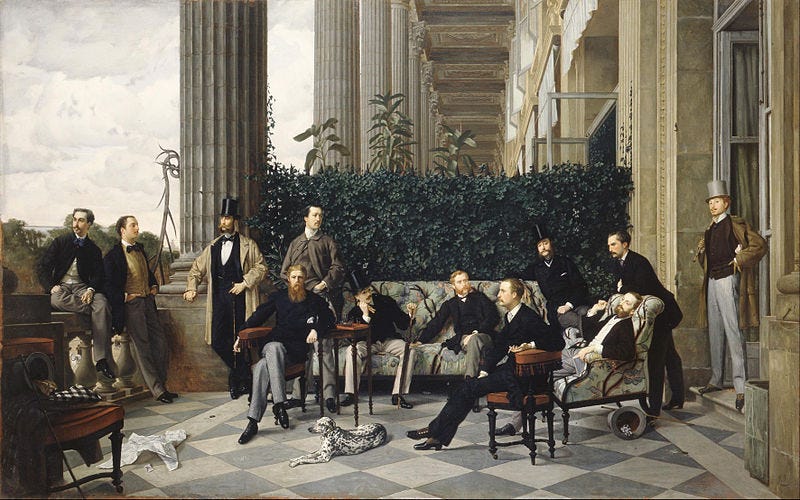I am not a gentleman. I strive after, and God willing possess already some of the qualities that people refer to when they use the term ‘gentleman’, but I will never claim the title. ‘Gentleman’ once described a very specific type of individual in Western societies, but over the years it has become a catchall word of myriad meanings. I contend that no two modern speakers of the word ‘gentleman’ mean the same thing.
Moreover, I find that the term is often used performatively, harnessing the legacy of what a gentleman once was. The term has lost all precision in its contemporary usage. Therefore, ‘gentleman’ should be disused in favor of more precise descriptions of the values of modern man.
You will notice that nowhere in Clubroom Conversations’ “About” does the term appear. It may come as a surprise, given that the image of the private members’ club accords with that of the gentleman in the classical sense.
What is a gentleman?
It is this gentleman in the classical sense who I want to describe first. The term gentleman originally described an aristocrat in good standing with codes of honor and morality in his society. The term is related to ‘gentry’. “Genteel” life took on specifics: one was of the upper, monied class, engaged in meaningful pursuits- politics, study, tending one’s estates, riding, hunting, and so forth- rather than something more mundane, like working or soldiering.

So, the classical gentleman was a man who possessed high social status, wealth in the form of money and property, power over society, and the moral fiber of virtue to moderate his use and enjoyment of all those goods. There were clear definitions of who was and was not a gentleman.
Gentlemen are Extinct
This society and the gentleman himself no longer exist. The disappearance of the classical gentleman coincided with the disappearance of the aristocratic structures which formed his habitat. The term ‘gentleman’ is an artifact of the same democratization which eliminated both the gentleman and his world. To be sure there are still certain men of great wealth, influence, and property. Yet few of them, if any, self-identify as a gentleman. The operative point is that you and I are most likely not one of them, nor are those identifying with this term today. Therefore, any use of the term is at least in part performative.

Now, this is not an exercise of nostalgic originalism. Describing the classical gentleman is necessary to highlight the many deviations the term ‘gentleman’ has taken since its genesis. Modern usage tends to isolate fragments of the classical ideal: a gentleman is exceptionally moral, well-dressed, cultured, socially adept, etc. Unfortunately, the fractured meanings of the word hollow it of any force. It is one word that no longer describes one man, but several characteristics of an ideal man. The complexity and historical baggage inevitably obscure the user’s meaning to the extent that no two people seem to be saying the same thing.
Even when intended to signal virtue or refinement, claiming the title “gentleman” risks coming off as cringeworthy and aspirational. It can imply, “I’m a good, cultivated man in a way others aren’t.” In many ways, “gentleman” has become shorthand for performative masculinity. It might describe a guy who pays attention to his style (often by overdressing or wearing old fashions that fly perilously close to costume), or simply the man who knows his scotch from his bourbon, or one who enjoys esoteric ‘manly’ things like cigars, books about World War Two, and holding doors for women.

There’s almost invariably an undercurrent of ‘old thing good’, a nod to the classical gentleman as an ideal. But severed from that context, these isolated gestures lack coherence and depth. They feel more like sycophantic affectations than the embodiment of a dearly earned societal role.
A term carrying a dozen connotations (not all positive) with no precision is useless at best and at worst, dangerous. Without a concrete meaning, the term devolves into a vague social signal. It’s the right-wing boy version of how left-wing girls come out as non-binary. It just signals that you’re unique and roughly aligned with what you take the word to mean without articulating that or showing real virtue. You might be different, and indeed you should embrace your distinct gifts and interests, so describe yourself as needed with specific, authentic terms.
New Words for New Men
The term ‘gentleman’ is beyond revival. It has passed out of relevance, and deviated into so many meanings that it is now meaningless. The sooner you adopt clear language about what is preferable in a man, the sooner a new, authentic ideal can take shape without the risk of ambiguity and alternate connotations.
Jidenna’s 2015 song “Classic Man” comes to mind. His aim is to offer a conception of the sort of man he wants to be and call others to be. He describes the Classic Man as such: he provides, he takes care of women in his life, he dresses well, he is willing to fight if pushed. All of these things could have been imprecisely described with the word ‘gentleman’, but luckily Jidenna avoided the temptation.
Further, Tanner Guzy made a great video that’s probably the main inspiration for this piece, and I recommend it to you:
Tanner focuses his assessment of the classical gentleman on the possession of strength and controlling the exercise of his power. What he’s describing is the virtue of meekness. Meekness presupposes that you have power and the virtue to exercise it with control. This plays on many aspects of the classical gentleman, without using the word as a shorthand. His language is fierce, but Tanner is on the right track in terms of how to construct a relevant conception of the ideal modern man. It is important to take advice from the past, just as important to ensure that what worked in the past is still relevant.
My intent is not to be overly cynical nor too critical of men who are trying to spur on the ongoing reformation of masculinity. It is a worthy cause, but one which is not helped by the term ‘gentleman’ with all of its outmoded connotations. It is the same case with the word ‘chivalry’ and even ‘knight’; the structures referred to no longer exist. They died with the aristocratic systems that gave them a specific legitimacy. 'Gentleman’ has come to embody anything you want it to in the general scope of the classical gentleman- his virtue, his dress, his cultivated nature, his social fluency- but no longer has a precise meaning.
There’s no use for a word that lays claim to something you are not and at best to describes what you are inadequately. When I envision the sort of man who reads Clubroom Conversations, I describe him: he is an incorrigible idealist who focuses on conversations of consequence. He probably shares many attributes of one who could be called a ‘gentleman’, but I think my use of the term would do nothing more than obscure my meaning. I stand by the elimination of the word ‘gentleman’ from contemporary use, and encourage you to do the same!



